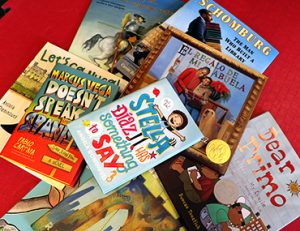 Multicultural and bilingual books allow all children to see themselves in the pages of a story. These books enable all children to learn more about the diverse world in which we live. Through these stories, children develop a better understanding and greater acceptance of all cultures, a great global awareness, and respect and empathy for all people.
Multicultural and bilingual books allow all children to see themselves in the pages of a story. These books enable all children to learn more about the diverse world in which we live. Through these stories, children develop a better understanding and greater acceptance of all cultures, a great global awareness, and respect and empathy for all people.
On March 9, educators, librarians, parents, and book enthusiasts gathered at Bank Street College for the “Diverse Voices in Latinx Children’s Literature” conference. Hosted by the Center for Children’s Literature, the day began with opening remarks from American Library Association President Loida Garcia-Febo, followed by panel discussions and book signings with renowned Latinx authors/illustrators including closing keynote presenter, Pura Belpré Award winner, and Sibert Medalist Duncan Tonatiuh, author and illustrator of Danza! Amalia Hernández and El Ballet Folklórico de México.
In her presentation, Garcia-Febo discussed the power of books, authors, illustrators, and librarians to promote inclusion and diversity and strengthen communities. To begin, Garcia-Febo greeted the audience with a poem, “Majestad Negra,” by Puerto Rican poet Luis Palés Matos.
“Authors and illustrators are dream makers. Diverse books can provide children of color with very inspiring experiences. They see themselves reflected in the stories they read [and] these stories empower,” she said. “Librarians—together with authors, illustrators, and educators, among other professionals—are enriching the conversation around these topics. [We] must continue to move forward to embed humanity, compassion, empathy, awareness, and understanding into our library services and the publication of more diverse books.”
The first panel titled “Exploring the Power of Visual Literacy Through Latinx Comics” was moderated by Shelley Diaz, Youth Selector at BookOps: New York Public Library and Brooklyn Public Library. Three panelists, including Raúl the Third, illustrator, Lowriders Blast from the Past; Richardo Siri, also known as Liniers Macanudo, author and illustrator, Buenas Noches, Planeta; and Edgardo Miranda-Rodriguez, author, La Borinqueña, discussed how their own childhood experiences with comic books influence their work today and how comic books—because of their unique format and the combination of illustration and text on the pages—can engage a more active type of reading.
The next panel, “Elevating Our Heroes Through Picture Books,” was moderated by Sonia Rodriquez of LaGuardia Community College and featured five celebrated authors and illustrators: Duncan Tonatiuh, author and illustrator, Danza! Amalia Hernández and El Ballet Folklórico de México; Raul Colón, illustrator, Miguel’s Brave Knight: Young Cervantes and His Dream of Don Quixote; Eric Velasquez, illustrator, Schomburg: The Man Who Built the Library; Anika Aldamuy Denise, author, Planting Stories: The Life of Librarian and Storyteller Pura Belpré; and Rudy Gutierrez, illustrator, Carlos Santana: Sound of the Heart, Song of the World.
“As a child growing up in a mixed race family, I needed Pura [Belpré] in my life,” said Denise, who reflected on her inspiration for Planting Stories. “I needed her as an example of a strong female librarian, Puerto Rican, boricua. One thing that’s been really rewarding for me with this book is hearing how many people say ‘I wasn’t aware of her story.’”
The final panel titled “Soy yo: Developing Identities & Relationships in Latinx Coming-of-Age Stories” was moderated by Carla España of Hunter College. Award-winning authors including Pablo Cartaya, author, Marcus Vega Doesn’t Speak Spanish; Angela Dominguez, author, Stella Diaz Has Something to Say; Hilda Eunice Burgos, author, Ana Maria Reyes Does Not Live in a Castle; and Aida Salazar, author, The Moon Within spoke on how their personal journeys influenced the development of the characters in their books and how the use of authentic language practices in the text of their stories is a crucial part of accurately capturing the experiences of bilingual children.
Tonatiuh concluded the conference with an inspiring message. “The [United States] has such a robust publishing industry but such a small percentage of the books are about people of color or people of other religions or physical abilities. And there is a real need for these kinds of books because … it really empowers [kids]. Their stories are important and their stories are valuable. It can create empathy and help people learn about someone who is different from themselves.”
“Exposing children to diversity in books will prepare them for life in a diverse world. This conference was developed to make us all more informed and to help us better serve our library, academic, and publishing populations,” said Cynthia Weill, Director of the Center for Children’s Literature and lead organizer of the conference.
To watch a video of the panel discussions, please visit bankstreet.edu/latinx-conference.